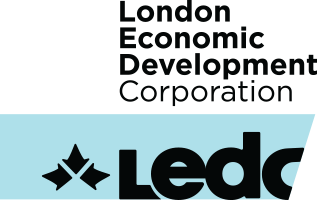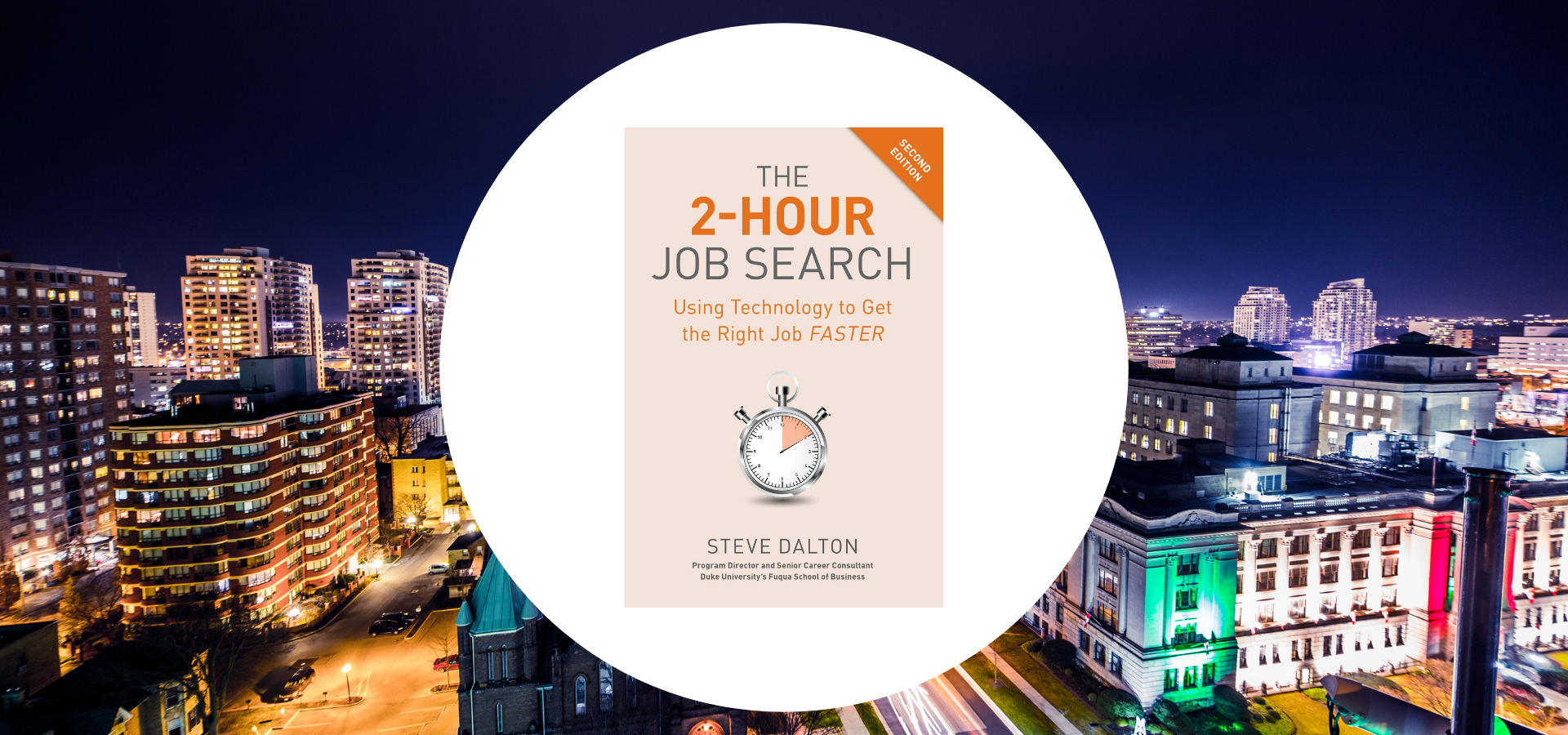Welcome to From the Forest City – your source for exciting ideas, innovations, and expertise coming out of London, Canada.
In these videos brought to you by the LEDC, you’ll soon discover why companies are investing and growing in London, and how their talented teams and products are making an impact. You’ll hear from growing local businesses about how they're expanding into new markets, launching new products, making investments, and local industry experts on topics that are relevant to your business. Every now and then we will speak with experts outside of London who have valuable insights to share with local businesses.
Enjoy!
Episode 4
We are speaking with Steve Dalton, Program Director and Senior Career Consultant at Duke University’s Fuqua School of Business, and Author of the Amazon bestseller The Two Hour Job Search: Using Technology to Get the Right Job FASTER. In 2012, Penguin Random House published Dalton’s debut book, The 2-Hour Job Search. His concepts are now taught at over a hundred universities worldwide, and Dalton regularly presents workshops and keynotes outlining his methods. He launched the 2nd edition April 2020 with updated advice on how to efficiently surf online job postings, how to reach out to contacts at your dream workplace and when to follow up, and advice on using LinkedIn, Indeed, and Google to your best advantage.
To learn more, visit https://2hourjobsearch.com/.
Transcript
Robert: So Steve, I've had the privilege of sharing your book “The two hour job search” with hundreds of job seekers ranging from students to very experienced professionals, and it is truly incredible to see that change in focus and energy that it inspires by helping them know how to effectively address what they perceive as the black hole of applying online. You must be very proud of the feedback you received. What are some of the most frequent comments you get from people who’ve actually followed through and been inspired by your ideas.
Steve: There is information out there on resumes and cover letters and interviewing, but there was nothing out there about how do you get that first interview. The two-hour job search I said I'm just going to focus on how do you get that first interview. It really boiled down to those three parts. How do I identify targets, reach out to people at those companies, and turn those people into allies.
It's a universal source of anxiety, the ability to put food on the table, for yourself, and your loved ones. Despite how widespread and critical that need is, there were no real instructions or how to get interviews. This is left up to each job seeker, here's 50 tips go figure out for yourself and that to me, just felt unconscionable. I was embarrassed that I'd been a career coach for a few years before I even had that insight.
I needed the 2008 financial crisis to really wake me up like wow, we're hurting people by giving them tips and like telling them to figure out what tips work best for them instead of curating at least a starter recipe for how to do this exactly. For me, what provides the most comfort when I hear from readers is that you brought structure to this chaos, you helped reduce my anxiety.
Robert: I must say that's been my experience as well of sharing your material because they don't know which step to take next, and they're also sort of at the whim of what's out there as opposed to actually digging in and prospecting for themselves.
Steve: What the two-hour job search essentially is, it's my instruction booklet, it's the exact manual, the start-up guide if you will. If my boss would tell me Steve you're fired, start looking for a job immediately the two-hour job search is exactly what I would do for the next 2 hours. Any additional time would be extraneous and unnecessary, any less time would be insufficient. In that two hours, I can create from scratch a strategy, I can create the target employer list, put that into a logical order of attack and draft outreach to my most promising contacts.
At that point, I simply need people to respond. I need other people’s assistance before I can make further progress, so it's not 2 hours a day and it's not 2 hours and you have a job, It's two hours at the very start. You can try completely different job search process that is very efficient and very specific, and then what you do each day thereafter really depends on the response that you get from the marketplace. Some days you have nothing to do, on other days you'll have a couple of meetings that you'll need to, but nothing in this process is arbitrary.
Robert: Now you're on your second edition, which is fantastic that you know that you’ve got such an audience that's inspired by your work. What's your favorite new insight or approach in the new edition?
Steve: The difference between the first, the original and the 2nd edition is there were eight years in time past and tens of thousands of people have tried the original process. When you cook any recipe tens of thousands of times, the recipe gets better. So I love that it's been crowdsourced with a bunch of ideas from a bunch of different users who tried it slightly in a slightly different way, and all of their best practices, they were kind enough to share with me.
One of the biggest gaps that I noticed was the follow up on the informational meeting. A lot of people would have to follow up the informational meeting and then not know how to transition from that informational meeting into an interview, so that's what inspired me to create the harvest cycle, which is a very specific process flow diagram. If this happens, do that, a very diagrammed process for how do you follow-up on these informational meetings to maximize the chance that it leads to an interview, which is the ultimate goal.
Robert: In this increasingly virtual world, are you finding any new considerations that a job seeker should pay more attention to?
Steve: This quarantined experience has been the occasion for which we've reconnected with some old friends, because leisure's been kind of limited. People we haven't talked in awhile, we reached out and reconnected, that need for contact, to connect with others, to be heard. I think that's really a service that a job seeker can provide, and I think job-seekers are always very self conscious about imposing on others but in reality this opportunity to allow someone to be heard in their job. They may have a job but maybe they are not very comfortable with their status about keeping that job. Maybe it's a turbulent time there, so I think getting out of that mindset of I'm imposing on others to a mindset of I just want to learn and listen.
Robert: So far, we've chatted from the job seekers perspective. What advice do you have for employers if they want to really get the best talent for their enterprise?
Steve: It's easy for employers to, and I think it's a very rational approach for them to simply put up job postings and screen them for people who have done this job before but somewhere else, ideally one of their competitors, that's a rational approach that makes a lot of sense. I think one thing that employers don't realize that they do is when they write job postings, they tend to put a wish list of items, not realizing that, that wish list of items that aren't really necessary for that job will make every job seeker who reads that job posting feel self-conscious and insufficient.
I know, why not ask for that, for everything if you can as an employer, why not ask for the world and the dream candidate, but I don't think they realize that, that can cause pain when they stray from realistic job requirements towards ideal job requirements. The second thing I would say is don't be afraid to train someone. And the third thing I would say is the person who proactively reaches out to one of your employees to ask why they're good at their work, a person who takes that informational meeting approach is demonstrating a lifelong skill. That’ll be useful to any organization, the ability to get the information that they don't currently have. The ability to turn a stranger into an advocate is going to be useful to any employer. Just be especially open to non-traditional candidates that build relationships to get on your radar rather than just throw resume at you.
Robert: You also have that typology of employers where you're actually looking for somebody who is going to be an active booster, and really connect with you effectively. Can you tell us any sort of stories about boosters that people have been able to find and just sort of the extraordinary benefit of actually being a genuine booster of somebody who's approached you?
Steve: It's tough to pick one, my mind immediately goes to my favorite booster story of all time. I was actually doing a talk in Canada and I had a student who came up who said they’d read my book and try it out and want to just thank me. They said they were, they had applied for a consulting firm and never heard back from the application. So they're like okay I’ll give this to our job search thing a try and so they reached out to some contact, somebody agreed to talk to them to do an informational, had the informational. This person was like really excited about them, refer them on to a colleague who got them an interview. They past first round interview past the second interview, got the offer and the day after they got the offer by phone, they got the automated email from the online job posting saying it was incredibly competitive year and were unfortunately unable to offer you an interview. So he was two different candidates in the company's eyes.
Robert: That's a great story. Thank you very much for sharing. You mentioned that you've been working on your next book. Can you win our appetites a little bit about what themes are you exploring now?
Steve: The second book is called “The Job Closer”. The Job Closer is a collection of efficiency-minded frameworks for all the other parts of the job search that I purposely excluded from the first book. It’s going to tell you how to get a resume done effectively and quickly. Same with cover letters, same with answering, tell me about yourself. I give my readers a formula for answering these questions efficiently and effectively with minimal anxiety. So really dig into what are employers going for when they ask a question like this and what's a framework that can make answering this question easier and focused on the information that the employer is most frequently seeking.
Robert: Thank you as always for your very thoughtful and inspiring reflections and you do give so many of us a path forward.
Transcribed by Speak


